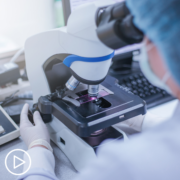Essential Small Cell Lung Cancer Testing
Essential Small Cell Lung Cancer Testing from Patient Empowerment Network on Vimeo.
What tests are essential for patients with small cell lung cancer (SCLC)? Dr. Triparna Sen defines small cell lung cancer and reviews the testing that should take place following a diagnosis.
Dr. Triparna Sen is an associate professor in the department of oncological sciences and co-director of the Lung Cancer PDX Platform at the Icahn School of Medicine at Mount Sinai in New York. Learn more about Dr. Sen.
See More from Thrive Small Cell Lung Cancer
Related Resources:

|

|

Advances in Small Cell Lung Cancer Research | Hope for the Future |
Transcript:
Dr. Sen:
I’m Dr. Triparna Sen. I’m an associate professor at the Icahn School of Medicine. I’m also the co-director of the Lung Cancer PDX program here at the Icahn School of Medicine at Mount Sinai, New York. I am the lead of a very translational research laboratory. Our goal is to find novel and effective therapeutic strategies for patients with lung cancer.
Katherine:
Thank you for that. We’re so glad to have you with us today. Would you define small cell lung cancer for our audience?
Dr. Sen:
Of course. So, one of the main research areas in my lab is to try to understand the biology of this very aggressive form of lung cancer. Having said that, as you all may be aware that lung cancer is one of the leading causes of cancer related mortality.
Lung cancer can be of two types, non-small cell and small cell. So, small cell is a very high-grade neuroendocrine tumor. And it is a very aggressive tumor.
The name is derived because the size of the cells that you see under the microscope is very small. So, it was originally called old cell carcinoma, and now it is called small cell lung cancer. What you need to remember about this disease is that it is about 15 percent of lung cancer diagnosis. It is very highly metastatic. It is often associated with a long history of smoking.
Katherine:
Okay. What testing should take place following a diagnosis of small cell lung cancer?
Dr. Sen:
The symptoms can include various things like coughing, labored breathing, or even bleeding during coughing. What happens then is the initial diagnosis actually happens through some sort of contrast enhanced CT or PET CT. Also, a confirmatory test that happens through immunohistochemistry with H&E. That is how we look at the histopathological features of the cancer. So once it is confirmed to be small cell lung cancer, then additional tests may happen through tumor biopsy where the doctor then confirms the stage of the tumor and how much the disease has spread.
So, there may be biopsies taken from the lung and from other regions of the body to determine how much the disease has spread.



